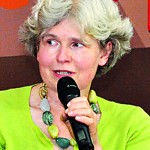Visceral vs. virtual: Exploring the future of the book
“Are books really dead?” was author Ashok Ferrey’s question at the British Council’s recent evening talk- ‘Power of the Book’. Following the powerful presentation on the fast growing popularity of the e-book by Director of MD Gunasena Rajiv Gunasena, the question was already on many minds. The panel for the event comprised author, Sunethra Rajakaruna, Director of Literature British Council, Cortina Butler and writer Lal Medewattegedera.
A book’s place in South Asia was discussed at some length and Sunethra smiled, “I wasn’t allowed to go to the library when I was younger.” Growing up in Ratnapura, her parents forbade her from using the public library because as she put it, “my mother said boys loiter there.” Her forbidden romance with books blossomed when she moved out of Ratnapura to Colombo, as she discovered the British Council library when it was down Galle Road.

Director of Literature British Council Cortina Butler. Pic by Indika Handuwala
The general attitude to books however in the region is reverence, commented Lal. Even as a young boy, he recalls being encouraged to read by parents and teachers. “I was told a book could give me the world.”
Sunethra said that while Sri Lankans do have a habit of reading the style of books accepted by the public she feels is still very archaic. “People tend to think that the characters on the pages you write reflect your own.” Breaking away from convention, she said the time has come for authors who write in Tamil and Sinhalese to adopt a more contemporary style. As language constantly changes, a modern or even colloquial tone helps to tell a story.
Lal who has served on syllabus designing bodies felt that currently even teachers are more open to modern literature. “There is a strong school of thought that classics should be learned first,” he said, speaking of literature as an academic subject. In choosing a book to teach teachers are not just driven by the style, but practical factors as well. For instance, the availability of supplementary material to help the class understand texts better, which he feels is freely available for classical literature.
Exploring if the e-book will in the future replace the physical book, Cortina said despite its form “a book is still a book.” Perhaps the “smell and feel” of a book added value to the whole reading experience, interjected Lal. The audience was divided.
It was brought to light that despite a host of benefits like portability and convenience of the devices that make e-books a possibility, physical books don’t run out of battery power, and provide a refreshing change in today’s gadget driven lifestyles when one comes home after a whole day of looking at a screen. Both in her experience and “studies show” Cortina said, “that e-books work fantastically for books of certain genres like sci-fi and if they have a strong narrative voice.” Non- Fiction or even other books that require a reader to go back to refer a page are often easier to read in the traditional way.
Even if e-books are the future, “Sri Lankan writers are safe for another 20 years” Sunethra laughed. The average Sri Lankan student doesn’t have a laptop or even a PC and this makes most reading devices too expensive. “They do have mobile apps to read books, but a separate reading devices like a Kindle is not for the Sri Lankan purse” which means printed books will be around for a while!


